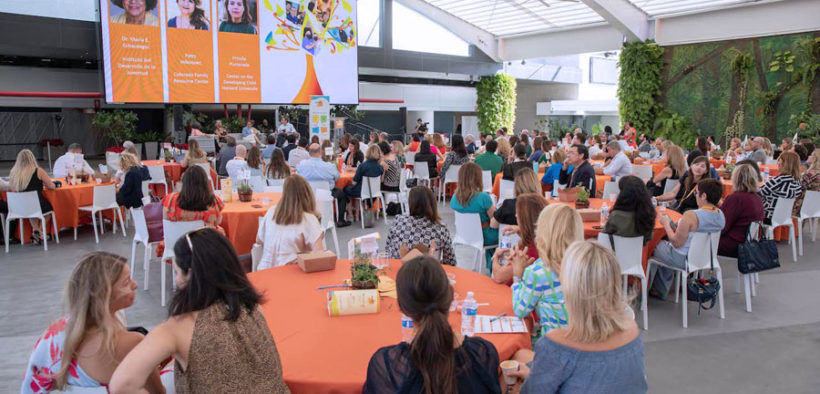Vimenti discusses importance of Two-Generation Model to erase poverty in Puerto Rico

Vimenti’s Two-Generation Model was highlighted as a key approach to pull vulnerable families in Puerto Rico out of generational poverty. Arguments on the importance and effectiveness of this model were presented during a panel discussion that took place this week during Vimenti’s “Empowering families to attain economic mobility” fundraising event at the Popular Center in Hato Rey.
“We have a long-standing and strong commitment to creating awareness around evidence-based models that can create economic mobility on the island,” said Bárbara Rivera-Batista, executive director of Vimenti.
“We are grateful to all of our allies — current and new — who joined us today to discuss the programs that have been executed successfully and which other initiatives we can implement to eradicate child poverty in the island,” she said.
The panel discussion, titled “Breaking generational poverty: The Two-Generation Vimenti Model,” addressed poverty through research-based programs that create economic mobility and self-sufficiency for children and their families. The Two-Generation Model connects families with several sources of support to cover their necessities.
“This approach puts families in the driver’s seat and recognizes that all families have strengths on which to build,” said Patty Velásquez, implementation director for Colorado Family Resource Centers and panel participant.
“It also encourages families to recognize and exercise their power and promotes access to resources available in their communities to help them achieve their immediate, short- and long-term goals toward family and child well-being,” she said.
Meanwhile, María E. Enchautegui Román, director of research and public policy at the Youth Development Institute and panel participant spoke about how Vimenti is implementing the Two-Generation Model and how it is helping vulnerable families in Puerto Rico.
“Vimenti is a whole family model in which the family is enrolled in the program, not just the child,” Enchautegui explained. “The case worker’s integration with the family is consistent and of high quality, and they pay attention to the family’s needs, be it adult education, employment, health, parenting, and of course, the children’s academic performance.”
Enchautegui added that Vimenti, which is in its fifth year of operations at the Ernesto Ramos Antonini public housing project in San Juan, has implemented its social and economic development programs with positive results.
She also said that Vimenti is currently running an evaluation in conjunction with Washington, D.C.- based think tank The Urban Institute and the Youth Development Institute.
“Vimenti’s staff knows the community very well and strives to always hear the community’s voice. We believe that models like Vimenti need to be expanded in Puerto Rico to get economic mobility for families and communities,” she said.
In addition to Velásquez and Enchautegui, the panel included Priscila Pumarada-Urrutia, assistant director of innovation partnerships and business development at Center on the Developing Child at Harvard University.
She spoke about the importance of building adult capacity as a vital strategy for children to develop their full potential, which is one of Vimenti’s goals.
“Adults need certain capabilities to succeed in life and support the development of the next generation. These capabilities help us to get and keep a job, provide responsive care for children, manage a household, and contribute productively to the community,” Pumarada said.
“When these skills have not developed as they should or are compromised by the stresses of poverty or other sources of ongoing adversity, our communities pay the price in population health, education, and economic vitality and in the development of our next generation. For this reason, the Two-Generation program, like the one Vimenti implements, not only helps raise adult capacity but also creates the conditions needed for the next generation to succeed,” Pumarada said.
Bertil Chappuis, a Vimenti and Boys & Girls Clubs of Puerto Rico board trustee, served as the panel’s moderator. He concluded the panel discussion with a call to action for Vimenti’s friends and partners to spread the word about Vimenti and offer their continued support so Vimenti can fulfill its mission to eradicate poverty in Puerto Rico.
“We urge you to learn more about Vimenti, get involved, and start contributing. I feel confident that, you will only grow in the conviction that you are making a difference and doing the right thing for Puerto Rico’s future,” said Chappuis.












